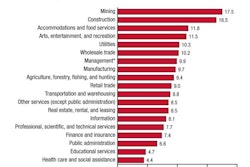
It’s becoming more challenging for transportation construction contractors to determine what they can and cannot legally do to keep drug use and abuse out of work zones.
Contractors are rightfully concerned with maintaining safe, drug-free construction sites. But the tight labor market, combined with the ambiguous, changing legal environment, are posing a major challenges to that goal as the construction sector copes with the epidemic of opioid addiction and increased legalization of marijuana use.
These daunting challenges were addressed during the 11th Annual Law & Regulatory Forum, part of ARTBA’s Transportation Construction Professional Development Week Conference, June 4-6 at ARTBA’s offices in Washington, D.C.
The legal landscape on what constitutes legal versus illegal monitoring shifts almost daily as the U.S. courts rule on one case after another, said presenter Dena Calo, a partner with Saul Ewing, Arnstein & Lehr. Employers in the construction sector and elsewhere have historically assumed that federal law banning the use of drugs in the workplace have always superseded state law and case law. However, in recent cases where employees challenged a contractor’s decision to terminate them after a positive drug test, court decisions have been trending in the opposite direction as more and more states legalize such substances as marijuana for both medicinal and recreational uses.
“The way the courts are trending matters, and court decisions are trending in favor of employees,” Calo said. “A number of my clients believed federal (statutory) language protected them, but in most states, that’s no longer true.”
Nonetheless, the statistics on the abuse of opioids and other drugs show the problem is acute, and marijuana is being increasingly considered as a substitute for opioids to combat the pain of construction-related injuries.
According to a Bloomberg News survey, 12% of U.S. workers are under the influence of drugs while on the job and the use is generally higher in the hospitality, trucking and construction sectors, Calo said.
What to do? In order to avoid lawsuits by employees terminated for drug-use at the workplace, Calo suggests contractors be transparent about workplace drug-testing based on the following principles:
- Respect the privacy and dignity of employees
- Provide adequate notice of testing program
- Detail the method for selecting employees to be tested
- Explain how samples will be analyzed
- Notify employees of the consequences of testing positive or refusing to be tested
- Receive written consent
- Establish procedures detailing exceptions for “false positives”
- Use a reputable laboratory
- Maintain confidentiality
Look for more on this topic in the May/June issue of Transportation Builder by ARTBA
















